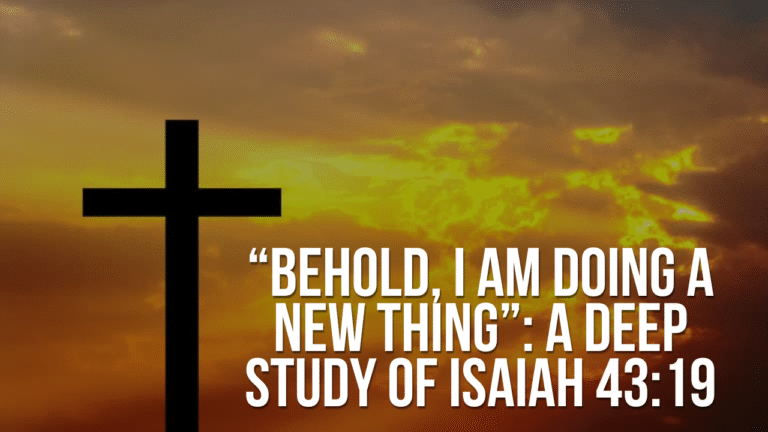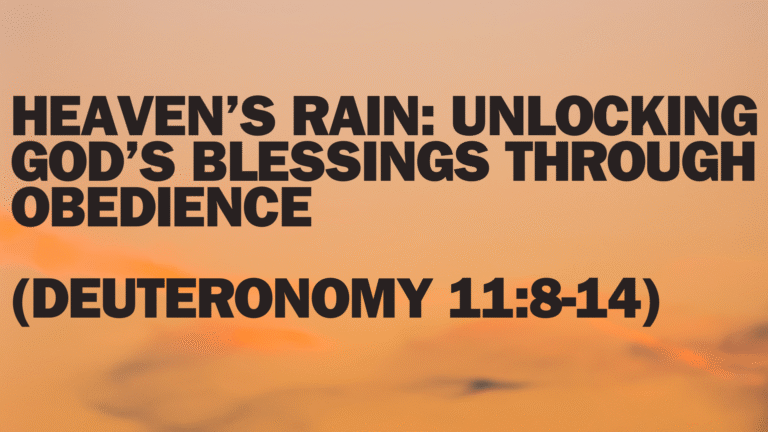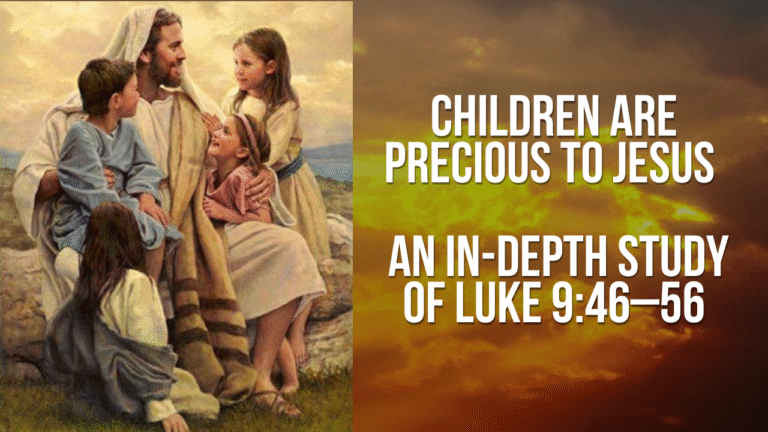Luke 1:37 – For with God Nothing Shall Be Impossible
1. Introduction
The Bible is filled with verses that inspire faith, but few are as concise and powerful as Luke 1:37: “For with God nothing shall be impossible.” These words, spoken by the angel Gabriel to Mary, encapsulate the very essence of God’s nature—His omnipotence. Human beings live within limitations of time, ability, and strength, but God is infinite. Where human vision ends, God’s possibilities begin.
This verse is not simply a statement of encouragement; it is a divine truth. It reassures us that no matter how dire circumstances may seem, God is greater than any obstacle. It also challenges us to expand our faith, to look beyond our natural limitations, and to trust in God’s supernatural ability.
In this article, we will explore Luke 1:37 in detail. First, we will examine its biblical and historical context to understand what the angel was truly saying to Mary. Then, we will unpack its theological meaning, seeing how it reflects the very nature of God. After that, we will apply it to our daily Christian lives, exploring how believers can live with faith in the face of impossibility. Finally, we will look at both biblical and real-life examples of God doing the impossible before concluding with a reflection on what this verse means for us today.
Luke 1:37 is more than a comforting promise—it is a foundation for living with bold faith. It reminds us that our faith is not in ourselves, but in the God who can make the impossible possible.
2. Biblical and Historical Context
To understand the depth of Luke 1:37, we need to place it within its immediate context. The verse occurs in the first chapter of Luke, during the announcement of the birth of Jesus.
Gabriel’s Message to Mary
The angel Gabriel had just appeared to Mary, a young virgin engaged to Joseph. Gabriel announced that she would conceive and bear a son—Jesus—who would be called the Son of the Most High and whose kingdom would have no end (Luke 1:31–33). Mary, understandably, was confused: “How will this be, since I am a virgin?” (Luke 1:34).
Gabriel explained that the Holy Spirit would come upon her, and the power of God would overshadow her, making this miraculous conception possible (Luke 1:35). To further affirm the power of God, Gabriel pointed to another miracle: Elizabeth, Mary’s relative, who was considered barren and was advanced in years, was already six months pregnant (Luke 1:36).
It is in this context that Gabriel declared: “For with God nothing shall be impossible” (Luke 1:37).
The Phrase in Greek
In the original Greek, the verse reads: “hoti ouk adynatesei para tou theou pan rhema.” Literally translated, it means: “For no word from God shall be impossible.” This emphasizes that when God speaks, His word carries the power to bring itself to pass.
Thus, the angel was not simply making a general statement about God’s power, but specifically affirming that God’s promises—His spoken word—cannot fail. If God has declared something, it will come to pass, no matter how impossible it may appear.
Connection to Old Testament Miracles
This statement also echoes Old Testament truths. In Genesis 18:14, when Sarah laughed at the idea of bearing a child in old age, the Lord asked: “Is anything too hard for the Lord?” The rhetorical question was answered when Sarah gave birth to Isaac. Similarly, Jeremiah declared: “Ah, Sovereign Lord, you have made the heavens and the earth by your great power and outstretched arm. Nothing is too hard for you” (Jeremiah 32:17).
Gabriel’s declaration to Mary therefore stands in continuity with God’s consistent revelation throughout Scripture: that He specializes in doing the impossible.
3. Theological Meaning of Luke 1:37
God’s Omnipotence
At its core, Luke 1:37 is about God’s omnipotence—His unlimited power. God is not restrained by the natural order of things. While He often works within the laws of creation, He is not bound by them. He created the laws of nature, and He can suspend or override them according to His divine will.
The virgin birth of Jesus is a perfect example of this. By human standards, conception requires the union of man and woman. But God’s plan of salvation required a miraculous sign: that His Son would be born of a virgin, emphasizing that Jesus’ origin was divine, not human.
God’s Faithfulness to His Word
The phrase “no word from God shall be impossible” also emphasizes God’s faithfulness. When God speaks a word, it is not empty. His word carries within it the power to accomplish what He has said. Isaiah 55:11 affirms this: “So is my word that goes out from my mouth: It will not return to me empty, but will accomplish what I desire and achieve the purpose for which I sent it.”
Human Limitation vs. Divine Possibility
The verse also highlights the contrast between human limitation and divine possibility. Mary’s question—“How will this be?”—reflects human reasoning. From her perspective, it was impossible. But Gabriel’s response shifted the perspective from human limitation to divine possibility.
Faith requires this shift. It asks us to stop focusing on what we cannot do and start focusing on what God can do.
4. Applications for Daily Christian Living
Luke 1:37 is not just for Mary; it is for every believer. Here are some practical ways it applies to daily life:
a. Trust God in Difficult Circumstances
When facing challenges—illness, financial crisis, broken relationships—it is easy to feel hopeless. This verse reminds us to trust that God is greater than our problems.
b. Pray with Boldness
Prayer is not limited by human logic. When we pray, we bring our requests to the God who can do the impossible. This should encourage us to pray bigger prayers, trusting God for breakthroughs that go beyond human ability.
c. Live with Hope
In a world filled with despair, Luke 1:37 fuels hope. It reminds us that even when things look impossible, God can intervene in ways we cannot imagine.
d. Step Out in Faith
Obedience often requires stepping into the unknown. Mary responded to Gabriel with: “I am the Lord’s servant. May your word to me be fulfilled” (Luke 1:38). Likewise, we are called to obey God even when we don’t see how things will work out.
e. Encourage Others
This verse is also a tool for encouragement. When others are struggling, we can remind them: “With God, nothing shall be impossible.”
5. Real-Life and Biblical Examples of God’s Power
Biblical Examples
-
Abraham and Sarah – God gave them a child in old age (Genesis 21).
-
Moses and the Red Sea – God parted the waters to deliver Israel (Exodus 14).
-
Joshua and Jericho – The walls fell by God’s power (Joshua 6).
-
David and Goliath – God used a young shepherd to defeat a giant (1 Samuel 17).
-
Jesus’ Miracles – Healing the sick, raising the dead, feeding thousands.
-
The Resurrection – The ultimate display of God’s power: raising Jesus from the dead.
Modern-Day Examples
-
Testimonies of people healed from terminal illnesses.
-
Families restored after years of brokenness.
-
Individuals delivered from addiction.
-
Provision in times of desperate need.
These examples remind us that God is not limited by time or circumstance. What He did in the past, He can still do today.
6. Conclusion
Luke 1:37 is a verse that has inspired countless believers throughout history. It is a declaration of God’s limitless power and His faithfulness to accomplish His word. Spoken in the context of the virgin birth, it affirmed that God’s plan of salvation would come to pass despite human impossibility.
For us today, it is a call to live with bold faith. It challenges us to trust God in our difficulties, to pray with confidence, to live with hope, and to step out in obedience. It also reminds us to encourage others with the truth that God’s power has no limits.
When life presents impossible situations, Luke 1:37 reminds us that we serve the God of the impossible. Whether it’s healing, provision, deliverance, or salvation, nothing is too hard for Him. The God who spoke the world into existence, who gave a child to a barren couple, who parted seas and raised the dead, is the same God who works in our lives today.
May we, like Mary, respond in faith and surrender, saying: “I am the Lord’s servant. May your word to me be fulfilled.” For with God, indeed, nothing shall be impossible.
Devotional – Nothing is Impossible with God
Luke 1:37 declares, “For with God nothing shall be impossible.” These words remind us that God is not limited by human weakness, time, or circumstances. Just as He gave Mary a child through a miraculous virgin birth and enabled barren Elizabeth to conceive, He is still at work today in ways that go beyond human understanding. When we face challenges that seem insurmountable, we can trust that God’s power is greater than our obstacles. His word never fails, and His promises always come to pass. Our role is to believe, surrender, and walk in faith, knowing that God specializes in turning impossibilities into testimonies.
Prayer
Heavenly Father, thank You for reminding me that nothing is impossible with You. Strengthen my faith when I face challenges that seem overwhelming. Help me to trust in Your promises, walk in obedience, and believe that You are able to do far more than I can imagine. In Jesus’ name, Amen.







